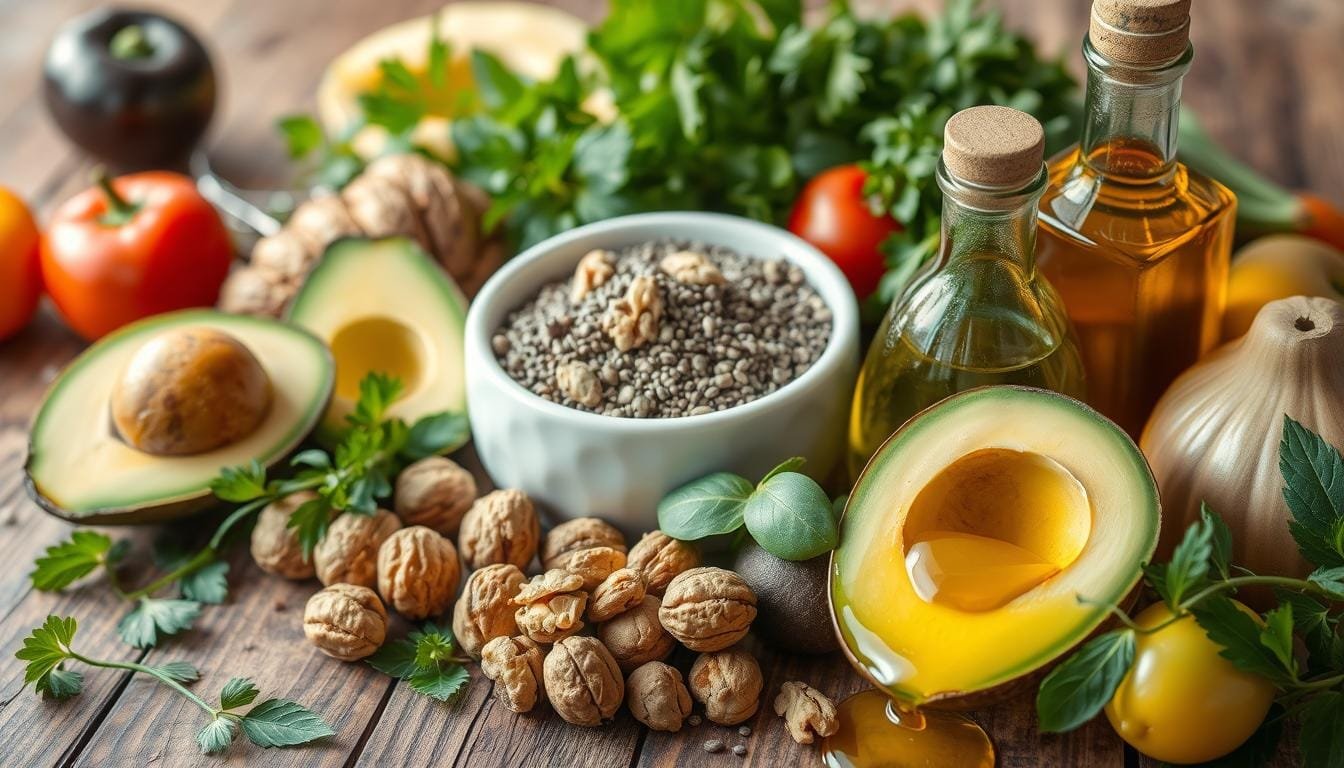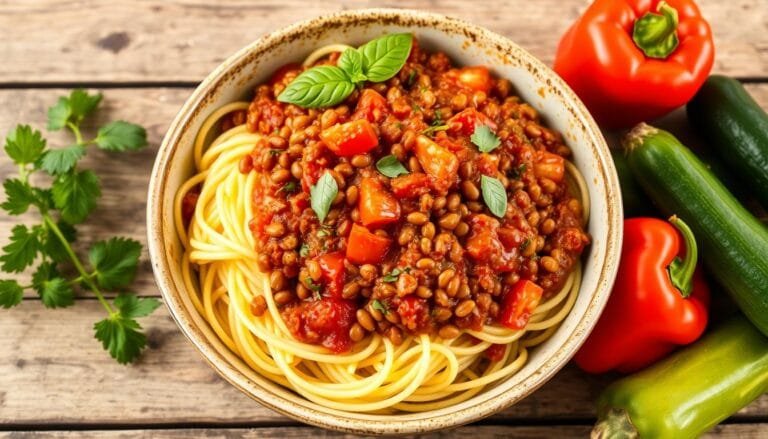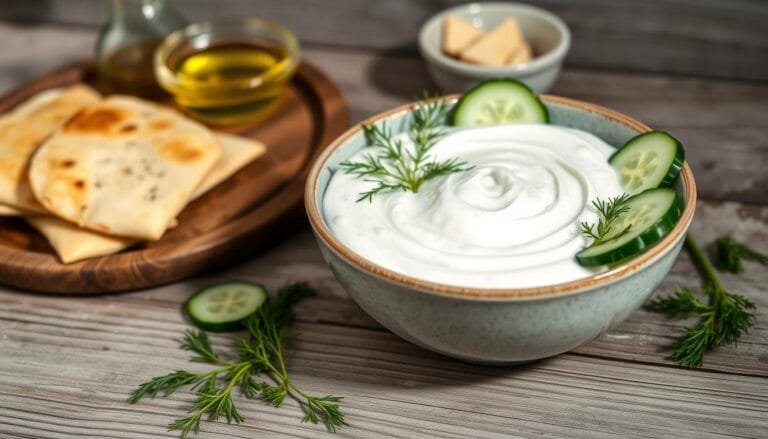As I’ve grown older, I’ve learned how much our food choices affect our health. I’ve been searching for the best, most nutritious foods for my body. Plant-based fats have really caught my attention.
These foods, like walnuts, avocados, and olive oil, are full of health benefits. They help our hearts and brains work better. Adding them to our diet can make us feel more alive and healthy.
In this article, we’ll look into why these fats are so important. We’ll find out the best plant-based sources and how to use them. Let’s discover how plant-based fats can make us feel better and live healthier lives.
Understanding the Role of Healthy Fats in Your Diet
Dietary fats play a big role in a healthy lifestyle. Not all fats are the same. Some, called unsaturated fats, are very good for us.
What Makes Certain Fats Healthy?
Unsaturated fats, like monounsaturated fats and polyunsaturated fats, are key to good health. They are liquid at room temperature. This is because of their special chemical structure.
Chemical Structure of Beneficial Fats
Their double bonds make them more flexible and fluid than saturated fats. This unique structure is why they’re good for us. They help our hearts, improve blood cholesterol, and boost brain function.
Impact on Daily Wellness
Eating unsaturated fats can make you feel better. They help prevent chronic diseases and support brain health. Knowing about these fats helps you make healthy choices for your body.
“Healthy fats are essential for various bodily functions, and they can be easily incorporated into a balanced diet.”
Plant-Based Fats for Health: Essential Guide to Natural Sources
Understanding plant-based fats is key to a healthy diet. These fats offer many health benefits, like heart health and brain function support. Let’s look at some top plant-based fat sources for your meals.
Nuts like walnuts, almonds, and pecans are full of good fats. Eating them can lower heart disease risk by 10-15%. Just 2-5% of your daily calories from these fats can make a big difference.
Seeds such as flax, chia, and hemp are packed with omega-3s. These fats fight inflammation and are good for your heart. Adding these seeds to your diet boosts your healthy fat intake.
- Avocados are 19% fat, mostly monounsaturated. They’ve been linked to a 16% lower risk of death over 22 years.
- Olives and olive oil have about 73% oleic acid. This fat is good for your heart, lowering bad cholesterol and raising good cholesterol.
- Cacao nibs, raw chocolate, are almost 50% healthy unsaturated fat. They’re also full of antioxidants.
Plant-based oils like safflower, corn, and soybean are great for fats. They’re good for cooking, baking, and salad dressings. These oils add flavor and nutrition to your meals.
| Plant-Based Fat Source | Key Nutrients and Benefits |
|---|---|
| Walnuts | High in omega-3 fatty acids, linked to heart and brain health |
| Chia Seeds | Rich in omega-3s and fiber, promoting digestive and cardiovascular wellness |
| Avocados | Abundant in monounsaturated fats, associated with a lower risk of mortality |
| Olive Oil | Contains oleic acid, which can help lower bad cholesterol (LDL) |
Adding a variety of plant-based fats to your diet is important. It ensures you get all the healthy fats your body needs for wellness.
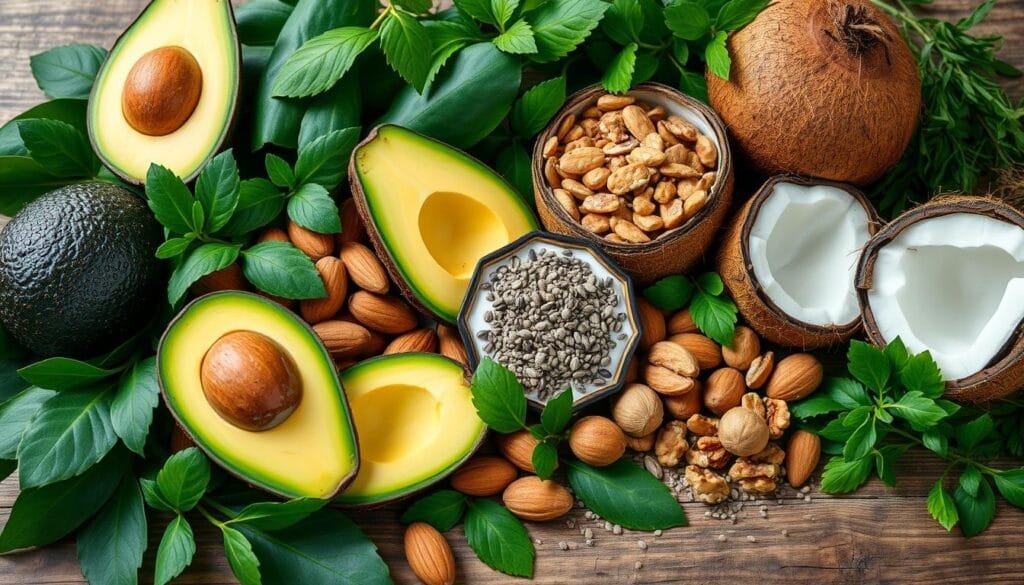
The Science Behind Unsaturated Fats and Their Benefits
Unsaturated fats are key to a healthy diet. They are found in plant-based foods and are vital for our health. Let’s explore the science behind unsaturated fats and their benefits.
Monounsaturated vs. Polyunsaturated Fats
Unsaturated fats come in two types: monounsaturated and polyunsaturated. Monounsaturated fats, like those in avocados and olive oil, help lower bad cholesterol and raise good cholesterol. Polyunsaturated fats, including omega-3 and omega-6 fatty acids, are important for brain function and skin health.
Omega-3 and Omega-6 Fatty Acids Explained
The right balance of omega-3 and omega-6 fatty acids is key for health. Experts say we should aim for a 1:1 to 2:1 ratio. Omega-3s, found in fatty fish and walnuts, can lower heart disease risk and support brain health.
“Eating more polyunsaturated fat, up to 15% of daily calories, in place of saturated fat can lower heart disease risk according to the American Heart Association.”
Omega-6 fatty acids, found in vegetable oils and nuts, are also vital. But too much can cause inflammation if not balanced with enough omega-3.
Understanding unsaturated fats helps us make better choices for our health.
Top Plant Sources of Healthy Fats
Adding the right plant-based fats to your diet is key for health. These fats help your heart and brain work better. Let’s look at some top plant-based fats you should eat every day.
Avocados are full of healthy fats, with about 11 grams in half an avocado. These fats help lower inflammation and improve cholesterol.
Nuts like almonds and walnuts are also great for fats. One ounce has about 14 grams of fat, including omega-3 and omega-6 fatty acids.
Seeds like flax, chia, and sunflower are also rich in fats. For example, a tablespoon of flaxseed has 2,350 mg of omega-3 fatty acid ALA, more than you need daily.
Olives and olive oil are also good for monounsaturated fats. They also have antioxidants and anti-inflammatory properties.
| Plant-Based Fat Source | Fat Content | Key Fatty Acids |
|---|---|---|
| Avocado (1/2 fruit) | 11 grams | Monounsaturated fats |
| Almonds (1 oz) | 14 grams | Monounsaturated, omega-6 |
| Walnuts (1 oz) | 14 grams | Omega-3 (ALA) |
| Flaxseeds (1 tbsp) | 2,350 mg ALA | Omega-3 (ALA) |
| Chia seeds (1 oz) | 5,000 mg ALA | Omega-3 (ALA) |
| Sunflower seeds (1 oz) | 14 grams | Omega-6 |
| Olive oil (1 tbsp) | 13.5 grams | Monounsaturated fats |
Adding these plant-based fats to your meals can boost your health. They help your heart and brain. Try different ways to enjoy these tasty and healthy fats.
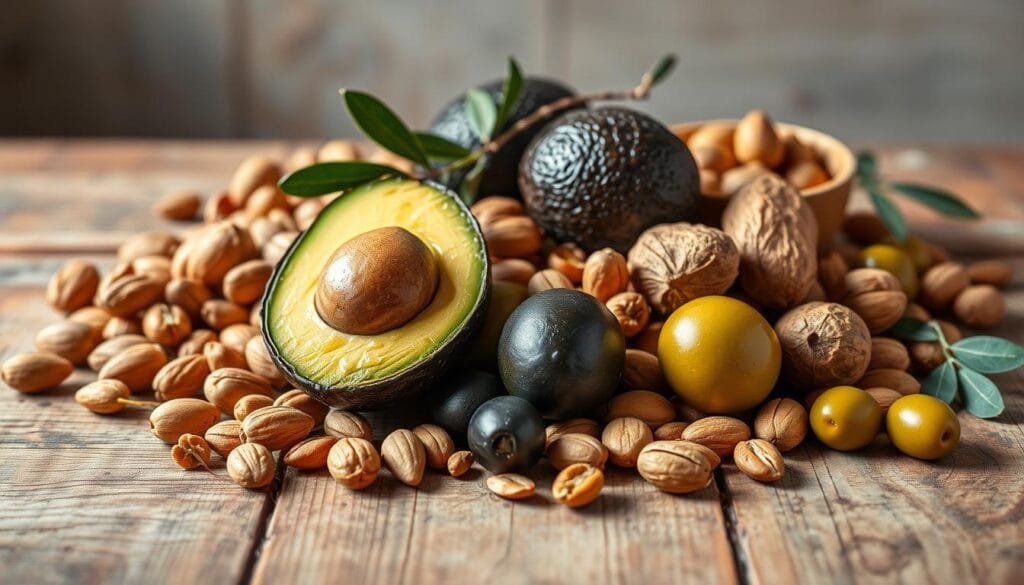
“Good fats like avocados, nuts, and seeds should be part of a balanced, plant-based diet for optimal health and wellness.”
How Plant-Based Fats Support Heart Health
Adding healthy plant-based fats to your diet can greatly improve your heart health. These fats help manage cholesterol, control blood pressure, and protect your heart.
Cholesterol Management
Fiber-rich plant foods clean your arteries and veins. They lower cholesterol and prevent fatty buildup. Plant-based diets improve your cholesterol ratio, as they don’t have cholesterol.
Blood Pressure Regulation
Plant-based omega-3s, like ALA in flaxseed, can lower heart risks. They may offer heart benefits similar to fish oil.
Cardiovascular Protection
Switching to a plant-based diet with lots of veggies, legumes, and grains lowers heart disease risk. Replacing 5% of animal fats with plant-based ones can cut heart disease death risk by 30%.
Remember, a successful plant-based diet for heart health requires a focus on whole, minimally processed plant foods, not just an abundance of high-calorie, unhealthy plant-based alternatives.
“Eating more plant-based fats may lower the risk of heart disease by up to 14%.”
By choosing plant-based fats, you can improve your heart health and live longer. Talk to a healthcare expert to add these fats to your diet.
Brain Function and Plant-Based Fat Connection
What we eat greatly affects our brain health. Up to 70 percent of the brain is fat. The type of fat we eat impacts our thinking and health. Omega-3 fatty acids are key for brain growth, learning, and memory.
Plant-based eaters might have lower omega-3 levels. But, eating ALA from flaxseed, soybeans, walnuts, and leafy greens helps brain health. These fats are vital for brain development and may lower disease risk.
Saturated fats, like in butter and fatty meats, should be limited. Trans fats, found in some oils, are bad for the brain. They can harm brain function.
To keep your brain healthy, eat a variety of plant-based fats. Include fish, poultry, eggs, legumes, and nuts for proteins and nutrients. Also, eat choline-rich foods like eggs, peanuts, beans, cauliflower, and spinach. They’re important for brain health, more so during pregnancy.
Healthy eating habits over time are key for plant-based fat benefits. By choosing nutrient-rich, plant-based foods, you support your brain and overall health.
Incorporating Healthy Plant Fats into Your Daily Meals
Adding healthy plant-based fats to your diet is easy and beneficial. It can improve your heart health and brain function. The trick is to find the right amount and balance.
Cooking Methods and Tips
Choosing the right fat is key to healthy cooking. Use oils like extra virgin olive oil, avocado oil, or coconut oil. These are good for sautéing, baking, and roasting veggies. They also taste great on salads or in dressings.
Adding nuts, seeds, and nut butters is another easy way to get healthy fats. Sprinkle almonds, walnuts, or chia seeds on your oatmeal or salads. Mix almond or peanut butter into smoothies or use it as a dip.
Portion Control Guidelines
- Use 2-3 tablespoons (30-45 ml) of healthy oils daily, like olive or avocado oil.
- Add 1-2 ounces (30-60 g) of nuts or seeds to your meals or snacks.
- Include a quarter to a half of an avocado (50-100 g) in your dishes.
- Spread 2-3 tablespoons (30-45 ml) of nut or seed butters on whole-grain toast or as a dip.
- Enjoy 10-20 olives (50-100 g) daily for their healthy fats.
Remember, moderation is key with healthy fats. Add them to your meals and snacks thoughtfully. This way, you get a balanced, nourishing diet.
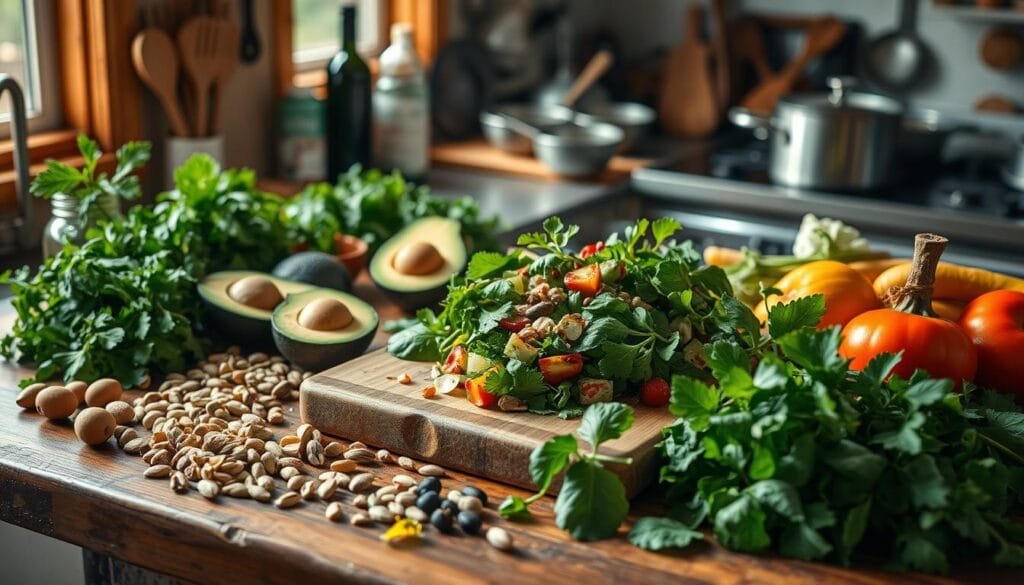
“Healthy fats are the foundation of a balanced, plant-based diet. By making simple swaps and adding nutrient-rich sources, you can elevate your meals and support your overall health.”
The Role of Plant Fats in Weight Management
When it comes to losing weight and staying healthy, the fats you eat matter a lot. Diets rich in animal fats are linked to obesity and health problems. But, eating plant-based fats can lower these risks.
Studies show that people who eat more plants are less likely to be overweight. The American Medical Association called obesity a disease in 2013. This shows how serious it is.
Plant fats, like those in nuts, seeds, avocados, and olive oil, make you feel full. This can help you eat less and keep your calorie intake down. These fats are also key for a balanced diet and for your body’s functions.
But, remember that plant fats are high in calories. So, it’s important to eat them in moderation. A diet rich in whole foods can help you lose more weight than other diets.
Adding the right plant-based fats to your meals can help you manage your weight. It also brings many health benefits. The trick is to find a balance that suits you.
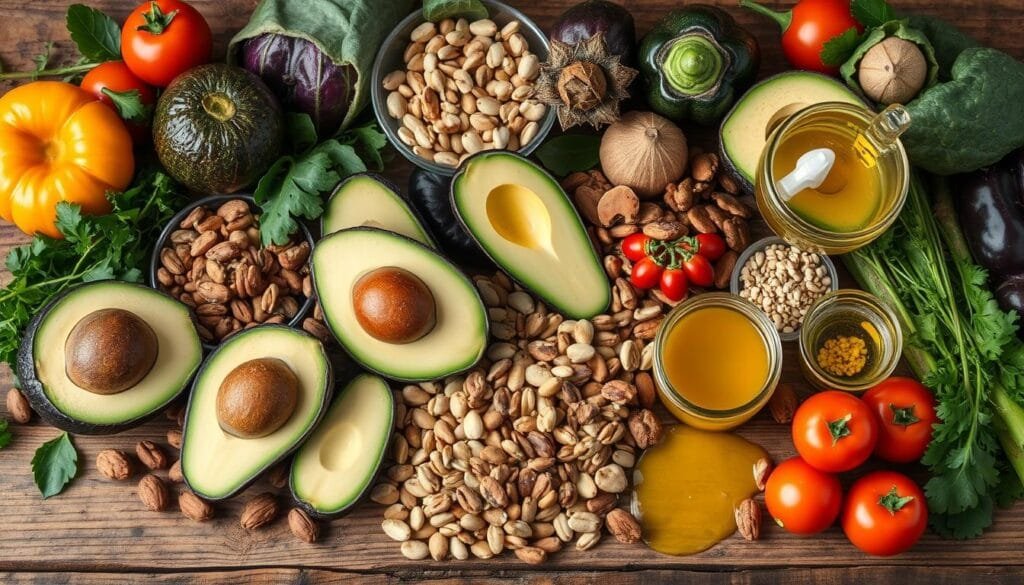
“A WFPB diet can lead to greater weight loss with some studies showing big weight loss compared to other diets.”
The role of plant fats in managing weight is complex. Knowing how these fats affect your health can help you make better choices. This supports your long-term health and weight goals.
Plant-Based Oils: From Kitchen to Health Benefits
I’ve learned to love plant-based oils for their health benefits and taste. These oils add flavor to my meals and are good for me. Olive, avocado, and walnut oils each have special nutrients.
Choosing the Right Cooking Oils
Choosing the right cooking oil is important. I pick oils with a high smoke point for high-heat cooking. Avocado oil and refined olive oil are great for this.
For lower heat, like in salad dressings, I use extra-virgin olive oil. It’s full of good fats.
Storage and Usage Tips
Storing oils right is key. I keep them in a cool, dark spot. This keeps their flavor and nutrients fresh.
I use oils before they expire. This way, I get the most health benefits and taste from them.
FAQ
What are the health benefits of plant-based fats?
What are the different types of healthy fats?
What are natural sources of plant-based fats?
What is the difference between monounsaturated and polyunsaturated fats?
What are the richest sources of plant-based fats?
How do plant-based fats support heart health?
What is the role of plant-based fats in brain function?
How can I incorporate healthy plant-based fats into my diet?
How do plant-based fats affect weight management?
What are the health benefits of plant-based cooking oils?
Source Links
- https://www.uclahealth.org/news/article/eating-healthy-fats-has-many-benefits
- https://www.myvegan.com/blog/nutrition/plant-based-sources-of-healthy-fat/
- https://www.mayoclinic.org/healthy-lifestyle/nutrition-and-healthy-eating/in-depth/fat/art-20045550
- https://www.heart.org/en/healthy-living/healthy-eating/eat-smart/fats/dietary-fats
- https://www.eatright.org/food/food-groups/fats/choose-healthy-fats
- https://pmc.ncbi.nlm.nih.gov/articles/PMC5577766/
- https://www.medicalnewstoday.com/articles/321285
- https://allplants.com/blog/lifestyle/healthy-fats-for-vegans
- https://www.healthline.com/health/food-nutrition/healthy-fats-guidelines
- https://nutritionsource.hsph.harvard.edu/what-should-you-eat/fats-and-cholesterol/types-of-fat/
- https://health.clevelandclinic.org/the-skinny-on-unsaturated-fats-why-you-need-them-the-best-sources
- https://www.healthline.com/nutrition/7-plant-sources-of-omega-3s
- https://plantbasedhealthprofessionals.com/how-to-get-healthy-fats-on-a-plant-based-diet
- https://www.uclahealth.org/news/article/plant-based-diets-may-be-heart-cardiovascular-wellness
- https://www.medicalnewstoday.com/articles/eating-more-plant-fats-grains-vegetable-oils-may-lower-death-heart-disease-risk
- https://wexnermedical.osu.edu/blog/boost-your-brain-power-with-the-right-nutrition
- https://www.ncbi.nlm.nih.gov/pmc/articles/PMC6742661/
- https://pmc.ncbi.nlm.nih.gov/articles/PMC6120115/
- https://plantiful-kitchen.com/blogs/recipes/healthy-fats-on-gluten-free-vegan-diet?srsltid=AfmBOooHFzwnHrFkAu-vsP392IQXxMcDp0ijcuQmJMq0m5gfXgvgLc2I
- https://www.eatingwell.com/article/7993588/ways-to-add-healthy-fat-to-your-meals/
- https://lifestylemedicine.org/articles/benefits-plant-based-nutrition-obesity/
- https://pmc.ncbi.nlm.nih.gov/articles/PMC6893503/
- https://www.news-medical.net/news/20231227/Plant-based-fats-and-proteins-shine-in-low-carb-weight-management.aspx
- https://health.clevelandclinic.org/how-to-choose-and-use-healthy-cooking-oils
- https://vegnews.com/healthiest-cooking-oil-vegan-diet
